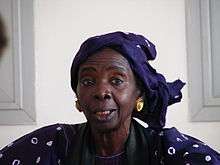Aminata Sow Fall
Aminata Sow Fall (born 27 April 1941) is a Senegalese-born author. While her native language is Wolof, her books are written in French. She is considered "the first published woman novelist from francophone Black Africa".[1]
Aminata Sow Fall | |
|---|---|
 | |
| Born | 27. April 1941 Saint-Louis, Senegal |
| Language | Wolof, French |
| Nationality | Senegal |
| Genre | Novel; short story |
| Children | 7 |
Life
She was born in Saint-Louis, Senegal, where she grew up before moving to Dakar to finish her secondary schooling. After this, she did a degree in Modern Languages in France and became a teacher upon returning to Senegal.[2] She was a member of the Commission for Educational Reform responsible for the introduction of African literature into the French syllabus in Senegal, before becoming director of La Propriété littéraire (The Literary Property) in Dakar (1979–88).[2] She was appointed the first woman president of Senegal's Writer's Association in 1985. In 1990 she founded the publishing house Éditions Khoudia.
Awards
- 1980 - Grand prix littéraire d'Afrique noire for La Grève des bàttu.
- 1982 - Prix International Alioune Diop for L'Appel des arènes.
- 1997 - honorary doctorate from Mount Holyoke College, South Hadley, Massachusetts.
Writing
| Library resources about Aminata Sow Fall |
| By Aminata Sow Fall |
|---|
Her books include:
- Le Revenant, Nouvelles éditions africaines, 1976. ISBN 2 7236 0109 9.
- La Grève des bàttu (1979); Nouvelles éditions africaines, 1980; Serpent à plumes (paperback 2001), ISBN 2-84261-250-7
- The Beggars' Strike, trans. Dorothy Blair, Longman (1986), ISBN 0-582-00243-5
- L'Appel des arènes (The Call of the Arena) (1982); Nouvelles éditions africaines, 1993. ISBN 2 7236 0837 9.
- Ex-père de la nation: roman, Paris: L'Harmattan, 1987. ISBN 2 85802 875 3.
- Douceurs du bercail, Nouvelles Editions ivoiriennes, 1998. ISBN 2 911725 46 8.
- Le jujubier du patriarche: roman, Serpent à Plumes, 1998
- Sur le flanc gauche du Belem. Arles: Actes Sud, 2002. ISBN 2 7427 4044 9.
- Un grain de vie et d'espérance. Paris: Françoise Truffaut Editions, 2002. ISBN 2-951661-45-2.
- Festins de la détresse: roman. Editions d'en bas. 2005. ISBN 978-2-8290-0318-9.
The film Battu (2000) by director Cheick Oumar Sissoko is based on her novel La Grève des bàttu.
References
- Margaret Busby, Daughters of Africa: An International Anthology of Words and Writings by Women of African Descent (1992), London: Vintage, 1993, p. 525.
- "Aminata Sow Fall", The University of Western Australia/French, 25 December 1995.
Further reading
- Simon Gikandi, Encyclopedia of African Literature, Routledge (2002), pp. 518–9. ISBN 0-415-23019-5
- Médoune Guèye, Aminata Sow Fall: Oralité et société dans l'oeuvre romanesque, Editions L'Harmattan (2005). ISBN 2-7475-8557-3
- "An Interview with Aminata Sow Fall". African Affairs (London) (1988) 87(348): 419-430.
- Laïla Ibnlfassi; Nicki Hitchcott, eds. (1996). "Marxist Intertext, Islamic Reinscription?". African Francophone Writing: a critical introduction. Berg. p. 163. ISBN 978-1-85973-014-0.
aminata sow fall.
- Ada Uzoamaka Azodo, Emerging Perspectives on Aminata Sow Fall: The Real and the Imaginary in her Novels, Africa World Press, 2007. ISBN 978-1-59221-557-7.
- Irene Udousoro, "Aminata Sow Fall’s Works: A Compendium of Development-Oriented Issues", Mediterranean Journal of Social Sciences, Vol. 4, No. 6, July 2013. pp. 67–71.